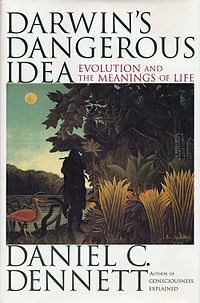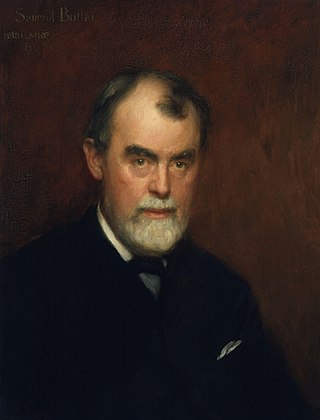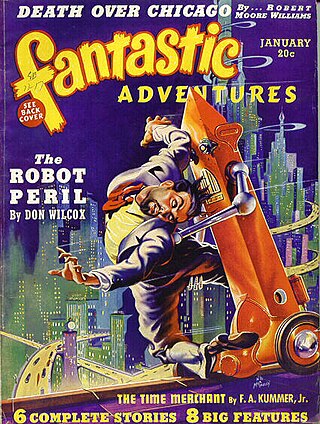Related Research Articles
The Chinese room argument holds that a computer executing a program cannot have a mind, understanding, or consciousness, regardless of how intelligently or human-like the program may make the computer behave. The argument was presented in a 1980 paper by the philosopher John Searle entitled "Minds, Brains, and Programs" and published in the journal Behavioral and Brain Sciences. Before Searle, similar arguments had been presented by figures including Gottfried Wilhelm Leibniz (1714), Anatoly Dneprov (1961), Lawrence Davis (1974) and Ned Block (1978). Searle's version has been widely discussed in the years since. The centerpiece of Searle's argument is a thought experiment known as the Chinese room.

Darwin's Dangerous Idea: Evolution and the Meanings of Life is a 1995 book by the philosopher Daniel Dennett, in which the author looks at some of the repercussions of Darwinian theory. The crux of the argument is that, whether or not Darwin's theories are overturned, there is no going back from the dangerous idea that design might not need a designer. Dennett makes this case on the basis that natural selection is a blind process, which is nevertheless sufficiently powerful to explain the evolution of life. Darwin's discovery was that the generation of life worked algorithmically, that processes behind it work in such a way that given these processes the results that they tend toward must be so.

Erewhon: or, Over the Range is a novel by English writer Samuel Butler, first published anonymously in 1872, set in a fictional country discovered and explored by the protagonist. The book is a satire on Victorian society.

On the Origin of Species is a work of scientific literature by Charles Darwin that is considered to be the foundation of evolutionary biology. It was published on 24 November 1859. Darwin's book introduced the scientific theory that populations evolve over the course of generations through a process of natural selection although Lamarckism was also included as a mechanism of lesser importance. The book presented a body of evidence that the diversity of life arose by common descent through a branching pattern of evolution. Darwin included evidence that he had collected on the Beagle expedition in the 1830s and his subsequent findings from research, correspondence, and experimentation.

The Problem of Pain is a 1940 book on the problem of evil by C. S. Lewis, in which Lewis argues that human pain, animal pain, and hell are not sufficient reasons to reject belief in a good and powerful God.

Consciousness Explained is a 1991 book by the American philosopher Daniel Dennett, in which the author offers an account of how consciousness arises from interaction of physical and cognitive processes in the brain. Dennett describes consciousness as an account of the various calculations occurring in the brain at close to the same time. He compares consciousness to an academic paper that is being developed or edited in the hands of multiple people at one time, the "multiple drafts" theory of consciousness. In this analogy, "the paper" exists even though there is no single, unified paper. When people report on their inner experiences, Dennett considers their reports to be more like theorizing than like describing. These reports may be informative, he says, but a psychologist is not to take them at face value. Dennett describes several phenomena that show that perception is more limited and less reliable than we perceive it to be.
"Computing Machinery and Intelligence" is a seminal paper written by Alan Turing on the topic of artificial intelligence. The paper, published in 1950 in Mind, was the first to introduce his concept of what is now known as the Turing test to the general public.

The Descent of Man, and Selection in Relation to Sex is a book by English naturalist Charles Darwin, first published in 1871, which applies evolutionary theory to human evolution, and details his theory of sexual selection, a form of biological adaptation distinct from, yet interconnected with, natural selection. Darwin used the word "descent" to mean lineal descendant of ancestors. The book discusses many related issues, including evolutionary psychology, evolutionary ethics, evolutionary musicology, differences between human races, differences between sexes, the dominant role of women in mate choice, and the relevance of the evolutionary theory to society.
New mysterianism, or commonly just mysterianism, is a philosophical position proposing that the hard problem of consciousness cannot be resolved by humans. The unresolvable problem is how to explain the existence of qualia. In terms of the various schools of philosophy of mind, mysterianism is a form of nonreductive physicalism. Some "mysterians" state their case uncompromisingly ; others take a "pseudo-mysterian" stance, being of the belief that consciousness is not within the grasp of present human understanding, but may be comprehensible to future advances of science and technology.

Mary Beatrice Midgley was a British philosopher. A senior lecturer in philosophy at Newcastle University, she was known for her work on science, ethics and animal rights. She wrote her first book, Beast and Man (1978), when she was in her late fifties, and went on to write over 15 more, including Animals and Why They Matter (1983), Wickedness (1984), The Ethical Primate (1994), Evolution as a Religion (1985), and Science as Salvation (1992). She was awarded honorary doctorates by Durham and Newcastle universities. Her autobiography, The Owl of Minerva, was published in 2005.

Samuel Butler was an English novelist and critic, best known for the satirical utopian novel Erewhon (1872) and the semi-autobiographical novel The Way of All Flesh. Both novels have remained in print since their initial publication. In other studies he examined Christian orthodoxy, evolutionary thought, and Italian art, and made prose translations of the Iliad and Odyssey that are still consulted.
The Nature of Order: An Essay on the Art of Building and the Nature of the Universe (ISBN 0-9726529-0-6) is a four-volume work by the architect Christopher Alexander published in 2002–2004. In his earlier work, Alexander attempted to formulate the principles that lead to a good built environment as patterns, or recurring design solutions. However, he came to believe that patterns themselves are not enough to generate life in buildings and cities, and that one needs a "morphogenetic" understanding of the formation of the built environment as well as a deep understanding of how the makers get in touch with the creative process.

A self-replicating machine is a type of autonomous robot that is capable of reproducing itself autonomously using raw materials found in the environment, thus exhibiting self-replication in a way analogous to that found in nature. The concept of self-replicating machines has been advanced and examined by Homer Jacobson, Edward F. Moore, Freeman Dyson, John von Neumann, Konrad Zuse and in more recent times by K. Eric Drexler in his book on nanotechnology, Engines of Creation and by Robert Freitas and Ralph Merkle in their review Kinematic Self-Replicating Machines which provided the first comprehensive analysis of the entire replicator design space. The future development of such technology is an integral part of several plans involving the mining of moons and asteroid belts for ore and other materials, the creation of lunar factories, and even the construction of solar power satellites in space. The von Neumann probe is one theoretical example of such a machine. Von Neumann also worked on what he called the universal constructor, a self-replicating machine that would be able to evolve and which he formalized in a cellular automata environment. Notably, Von Neumann's Self-Reproducing Automata scheme posited that open-ended evolution requires inherited information to be copied and passed to offspring separately from the self-replicating machine, an insight that preceded the discovery of the structure of the DNA molecule by Watson and Crick and how it is separately translated and replicated in the cell.
The watchmaker analogy or watchmaker argument is a teleological argument, an argument for the existence of God. In broad terms, the watchmaker analogy states that just as it is readily observed that a watch did not come to be accidentally or on its own but rather through the intentional handiwork of a skilled watchmaker, it is also readily observed that nature did not come to be accidentally or on its own but through the intentional handiwork of an intelligent designer. The watchmaker analogy originated in natural theology and is often used to argue for the pseudoscientific concept of intelligent design. The analogy states that a design implies a designer, by an intelligent designer, i.e. a creator deity. The watchmaker analogy was given by William Paley in his 1802 book Natural Theology or Evidences of the Existence and Attributes of the Deity. The original analogy played a prominent role in natural theology and the "argument from design," where it was used to support arguments for the existence of God of the universe, in both Christianity and Deism. Prior to Paley, however, Sir Isaac Newton, René Descartes, and others from the time of the Scientific Revolution had each believed "that the physical laws he [each] had uncovered revealed the mechanical perfection of the workings of the universe to be akin to a watch, wherein the watchmaker is God."

Influences on Karl Marx are generally thought to have been derived from three main sources, namely German idealist philosophy, French socialism and English and Scottish political economy.
Algorithm characterizations are attempts to formalize the word algorithm. Algorithm does not have a generally accepted formal definition. Researchers are actively working on this problem. This article will present some of the "characterizations" of the notion of "algorithm" in more detail.
Artificial intelligence is a recurrent theme in science fiction, whether utopian, emphasising the potential benefits, or dystopian, emphasising the dangers.
Plant rights are rights to which certain plants may be entitled. Such issues are often raised in connection with discussions about human rights, animal rights, biocentrism, or sentiocentrism.

Natural Theology or Evidences of the Existence and Attributes of the Deity is an 1802 work of Christian apologetics and philosophy of religion by the English clergyman William Paley (1743–1805). The book expounds his arguments from natural theology, making a teleological argument for the existence of God, notably beginning with the watchmaker analogy.

AI takeover—the idea that some kind of artificial intelligence may supplant humankind as the dominant intelligent species on the planet—is a common theme in science fiction. Famous cultural touchstones include Terminator and The Matrix.
References
- ↑ Project Gutenberg eBook Erewhon by Samuel Butler.
- ↑ Breuer, Hans-Peter. 'Samuel Butler's "the Book of the Machines" and the Argument from Design.' Modern Philology, Vol. 72, No. 4 (May 1975), pp. 365–383
- ↑ Flaccus, Louis. University lectures delivered by members of the faculty in the free public lecture course, p. 143
- ↑ Excerpted from review by Tal Cohen, 30 September 1998.